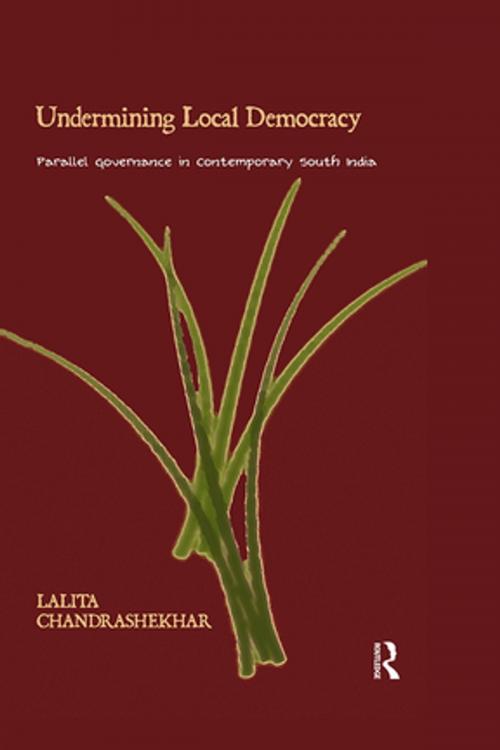Undermining Local Democracy
Parallel Governance in Contemporary South India
Nonfiction, Social & Cultural Studies, Political Science, Government, Public Affairs & Administration, Social Science| Author: | Lalita Chandrashekhar | ISBN: | 9781317809357 |
| Publisher: | Taylor and Francis | Publication: | March 21, 2014 |
| Imprint: | Routledge India | Language: | English |
| Author: | Lalita Chandrashekhar |
| ISBN: | 9781317809357 |
| Publisher: | Taylor and Francis |
| Publication: | March 21, 2014 |
| Imprint: | Routledge India |
| Language: | English |
Focusing on Karnataka in India, this study examines the implications of the model of development sought to be introduced in the entire country through the governance reforms of the post-1991 period — a model that bypasses Panchayat Raj institutions (PRIs), resulting in a majority of the population being left outside the purview of development.
These changes in governance resulted in, among other things, the prolific growth of NGOs in the country, particularly in Karnataka. Explaining how community-based organizations (CBOs) set up by these NGOs have made their way into rural Karnataka, this book expresses concern over how they now perform functions that rightly belong to PRIs following the 73rd Amendment to the Constitution which devolves 29 functions to local self-government, passing on the funds they receive from the centre to their district and village branches, though these should actually go to PRIs.
The book argues that elected representatives have been put in place by the people at all levels, and it is they who should take decisions regarding the development of this country. In the post-liberalisation period, governance through institutions that eschew political decentralisation is fraught with hazards. Not only will avenues for the expression of people’s wishes be lacking in such a scenario, but there will also be increasing inequality, resulting in a skewed development. The inclusiveness which the present government seeks will elude them unless they restore and strengthen Panchayat Raj institutions.
Focusing on Karnataka in India, this study examines the implications of the model of development sought to be introduced in the entire country through the governance reforms of the post-1991 period — a model that bypasses Panchayat Raj institutions (PRIs), resulting in a majority of the population being left outside the purview of development.
These changes in governance resulted in, among other things, the prolific growth of NGOs in the country, particularly in Karnataka. Explaining how community-based organizations (CBOs) set up by these NGOs have made their way into rural Karnataka, this book expresses concern over how they now perform functions that rightly belong to PRIs following the 73rd Amendment to the Constitution which devolves 29 functions to local self-government, passing on the funds they receive from the centre to their district and village branches, though these should actually go to PRIs.
The book argues that elected representatives have been put in place by the people at all levels, and it is they who should take decisions regarding the development of this country. In the post-liberalisation period, governance through institutions that eschew political decentralisation is fraught with hazards. Not only will avenues for the expression of people’s wishes be lacking in such a scenario, but there will also be increasing inequality, resulting in a skewed development. The inclusiveness which the present government seeks will elude them unless they restore and strengthen Panchayat Raj institutions.















